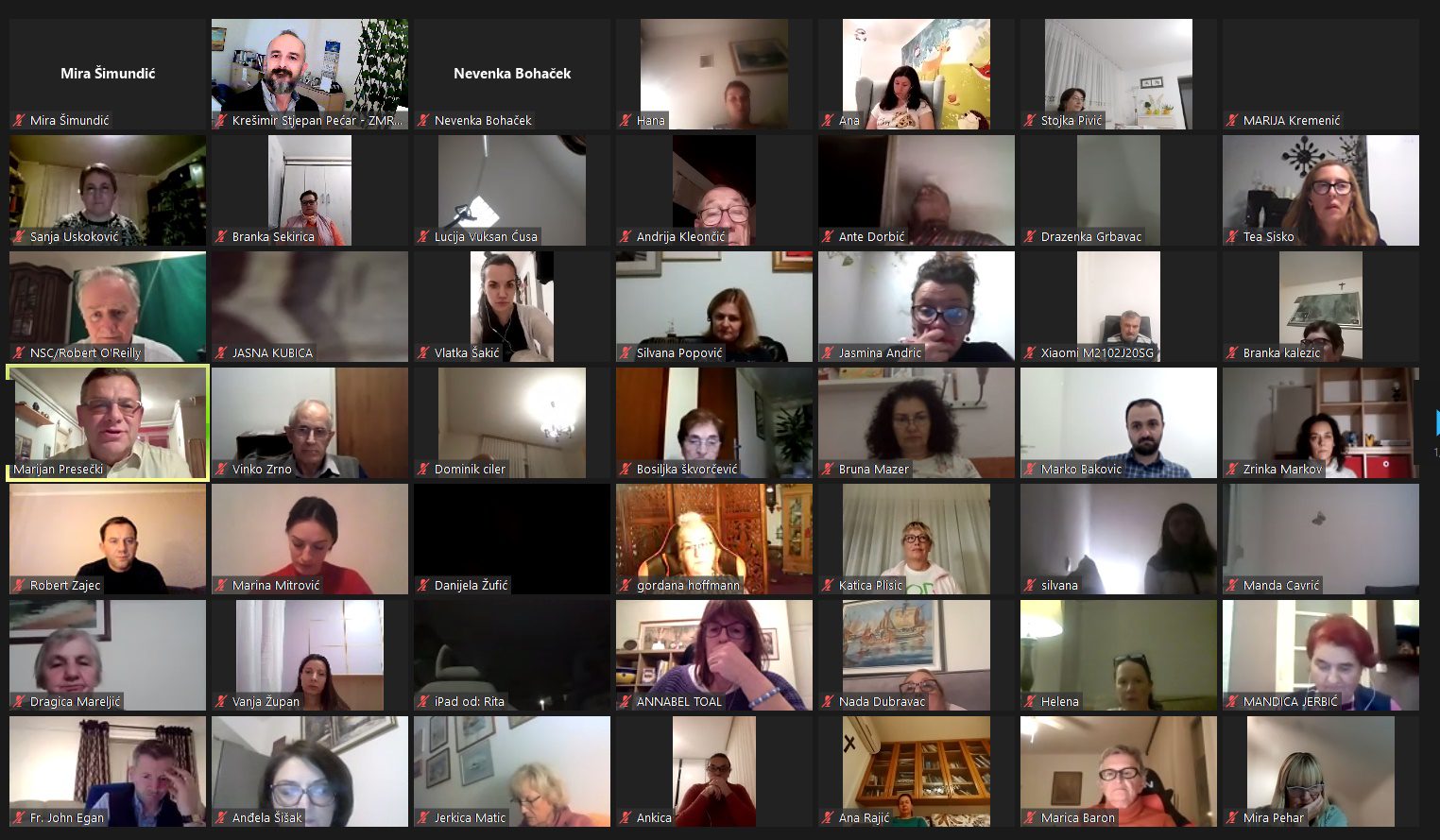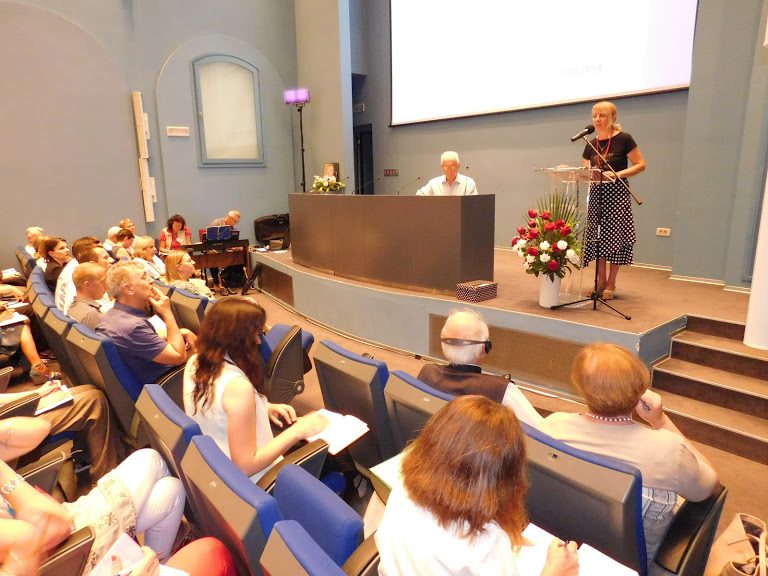From „A Minute for You“ by prof. Dr sc Tomislav Ivančić, broadcast on 7, 8 and 9 July 2017
Source: www.ple-mir.com
Anthropological medicine is a scientific medical discipline that contains a therapeutic method called hagiotherapy. Hagiotherapy in itself contains an anthropological hagiotherapeutic reality, which means a hagiotherapeutic anthropology that studies man, but in the aspect of the wounding of his spiritual soul and the possibility of therapy of that same spiritual soul. So it is not some kind of medicine that would study the body or psyche of man, but it studies the spiritual soul. Hagiotherapy also has its specifics that neither psychiatry nor somatic medicine have. People use somatic medicine by taking medication which cure them. Also, in psychiatry a doctor does not cure patients but medication is taken or through psychological methods it is attempted to lead the patient to change his life attitude so that he can improve his psychological condition. However, hagiotherapy is about something else. Hagiotherapy does not have its own pharmacy, nor does it have its own specific pharmaceutical company that would make medication.
The cure is love and freedom in the hagioassistant
In hagiotherapy, the medicine is actually the content of the therapist or hagioassistant himself. The hagioassistant should have in himself the love that he, through his own healing, has managed to absorb into himself and that love radiates to the patient through him. He should have within himself the experience of freedom from addiction to cigarettes, drugs, or alcohol, or gambling, or swearing, or gossiping… And when he has freed himself from something, then that freedom from him passes on to others. By his own healing from various addictions a hagioassistant becomes free, and that freedom within him creates new synapses in the brain, that is, new possibilities that have an incredible effect on the brain of the hagiopatient and he immediately experiences his healing.

In other words, a mistake can be made in hagiotherapy if the hagioassistant does not understand his profession well, so if he thinks it is enough to interpret a lot of things to the hagiopatient, tell him the diagnosis and therapy, to tell him to try to become aware of God’s love or to become aware of his wish to be free. That is not enough. It is necessary for a hagioassistant to mediate and to possess the health that he wants to give to a hagiopatient. That is the specificity of hagiotherapy. However, man’s spiritual soul does not have parts, but it is always a whole. Because the spiritual soul is damaged and wounded, it is unable to project health from itself so it projects diseases and new wounds. Man who is spiritually wounded, who has not experienced love, shows aggression and creates something different than health around him; aggressive people who protect themselves from him with aggression.
On the contrary, man who has succeeded in absorbing basiccc love and trust in himself, an experience that he is loved, precious and wanted, he projects what he is from himself. Just like a lamp that is plugged in and glows light and joy, people see and live beside the lamp and the lamp whose light bulb has burned or is not plugged in spreads darkness and therefore fear. It is the same with the hagioassistant who has that light in himself, who has been healed from a number of addictions, wounds, negativities, self-pity and so on, he affect the hagiopatient in that way so a hagiopatient becomes healthy.
In other words, for hagiotherapy, it is essential that workers in hagiotherapy are people who have their own experience of hagiotherapeutic methods and so they have the proof within themselves that the methods are efficient and the proof how the methods work and how to mediate them.
The realities of the spirit arise in the heart
Furthermore, in hagiotherapy it is often misunderstood that it is important to just say, for example, „It will be better.“ or the sentence, „I can. I will. I believe.“ as if those words verbally spoken can make something happen. That is wrong. Because the spirit of man and the spiritual soul are not a language. Language only utters learned formulas and words that for the most part are not always connected with the heart.
Only those words which are connected to the heart are the ones that touch us, for example woundedness or goodness of another man, which touch not only our emotions, because emotions are psychic level, but far deeper, they touch our affects and thus change us from within. So when our tongue pronounces those words, when it is connected with the heart, the one who listens to us experiences a certain peace, freedom, love, something that has thrilled him because he feels somebody is thinking of him, respects and values him. Then, the realities of the spirit arise in the heart and the tongue pronounces them. Pronouncing the words, we affect others around us but also affect ourselves.
However, by pronouncing the words, „It will be better.“ with deep confidence because we have already experienced that or because we are deeply touched with what somebody told us that with those words it is possible to create certain recuperation or at least start the process of spiritual healing. In that way health will spontaneously be produced. Words are inscribed in our genome and thus affect all cells. It is interesting how hagiotherapy actually helps to change the records in our genes, that is, to give our genome a new record that our freedom decides our freedom and that goodness in us decides, not evil.

It is not so easy to be a hagioassistant, ie a worker in hagiotherapy. One doctor said it was far harder to study hagiotherapy than medicine. It is certain that hagiotherapy is a basic therapy because it contains cures for more than 70% of the causes of all diseases of the psyche and body. That is why it is extremely important to work on hagiotherapy. But it is necessary to know that hagiotherapy first deals with the spiritual soul. So, it deals neither with the psyche nor the body.
Secondly, its science is anthropological medicine and hagiotherapy is the method of that work. Hagiotherapy does not deal with any religious issues and problems. That is the concern of the Church, faith and religion. It does not deal with any psychic problems because psychotherapy, psychology and psychiatry do that. It does not deal with any physical problems or somatic issues because that is what medicine deals with. Hagiotherapy is concerned with its own area, the spiritual soul.
Nonetheless, it is easy to replace or mix hagiotherapy with some kind of charity work or some kind of religious work. Or, some might think that it is some kind of prayer that heals all diseases. A hagioassistant can encounter some problems if he thinks that he is obliged to help a hagiopatient in all his problems; both physical, social, interpersonal and psychical different problems, wounds and crises. The hagioassistant falls into the trap if he thinks that he has to be a counsellor to his hagiopatient in various matters; by doing so he is not doing his job, and that he is trying to do is wrong because he is not an expert in this field.
To be disciplined, humble and simple
Although prayer heals physical, psychical and spiritual diseases, a systematic work with patients cannot be done if we talk about prayer. Prayer cannot systematically heal and prayer does not depend entirely on us. Our prayer is a conversation with God. Furthermore, not everyone can pray with a hagiopatient. In other words, if someone is a hagioassistant that does not mean that he is also a person of prayer and if he is trying to cure a patient through prayer, he will disappoint the patient. Prayer has to be left to those who are experts, priests or others who are experts in that area and who help people in that way. A hagioassistant does not have the right to mix competences.
Also, a hagioassistant who has studied psychology and psychiatry may fall into the trap of thinking that he can affect a hagiopatient on the level of psychotherapy and psychology, which is also wrong. A hagioassistant has to do hagiotherapy so a hagiopatient can come to him not to a psychologist or psychiatrist. If a hagioassistant applies psychology and psychiatry instead of hagiotherapy, he is unjust to the hagiopatient and he will certainly not help him.
In other words, there is a great responsibility for a hagioassistant to firmly stick to his profession, like he is attached to it, to do what he is sent and chosen to do, to do what he has learned in hagiotherapy and to do what needs to be done in the area of hagiotherapeutical competence.
If it is necessary to pray for a patient, the patient should be sent to the Church among priests or in some kind of a prayer group; if psychological or psychiatric help is needed, the patient should be sent to those kinds of doctors, and a hagioassistant must and can do only hagiotherapy. If a hagioassistant is superficial or is helping people in some other way, he is bringing disgrace on the authority of hagiotherapy and he does harm both to himself, to hagiopatients and others.
It is very important to be disciplined, humble and simple and not to use hagiotherapy in all situations and for everything. Using an all-rounded approach in a negative way is always superficial and it is an indication that the one who does it is not an expert in hagiotherapy but some kind of alternative or a ‘charlatan’. Let us be aware that hagiotherapy is not for everyone and everything, it is not like a prayer that can heal everything. It heals only the spiritual soul and nothing else. But it can help the psychic soul and the whole body if at her level, at the level of the spiritual soul, it heals all causes of the disease that have appeared in the somatic and psychic area. But that is not about the healing in the somatic and the psychic area but about the healing in the spiritual area.
These are the rules which hagioassistants must firmly adhere to so that they can be great hagioassistants and so that they can experience the miracle of how to help man.
This article is free. If you want to support our work, you can become our supporter. Information on how to become our associate or supporter of the Hagiotherapy Foundation Tomislav Ivančić PhD can be found here and thus contribute to the development of hagiotherapy and the realization of our vision.
He was born in Davor in 1938. After studying philosophy and theology in Zagreb and Rome, he was ordained a priest of the Zagreb Archdiocese in 1966. After achieving a master’s degree in philosophy and a doctorate in theology from the Pontifical Gregorian University in Rome, he returned to Zagreb in 1971, where he became a professor at the Catholic Faculty of Theology, University of Zagreb. He is the head of the Chair of Fundamental Theology, and was one of the editors of the Theological Review. Areas of his scientific work are philosophy, theology and literature. He explores the relationship between philosophy and theology, faith and science, atheism and religiosity, revelation and faith, the Church and ecclesial communities, Christianity and religion, the phenomenon of sects and issues of theological epistemology. His special field of interest is the study of man’s existential-spiritual dimension, where he discovers the way of modern evangelization and the necessity of the development of spiritual medicine, which, along with somatic and psychological, is indispensable in the complete healing of man, especially in the healing of spiritual diseases and addictions. For this purpose, he developed the method of hagiotherapy and founded in 1990 in Zagreb the Center for Spiritual Help, of which he is the head. From 1971, in addition to working at the faculty, he was a student religious teacher in Zagreb, the initiator of the prayer movement within the Church of the Croats, the founder of a religious society called the Prayer and Word Community(MiR), and the leader of numerous seminars for spiritual renewal and evangelization at home and abroad. After completing his studies and scientific doctorate in fundamental theology at … (Read more at https://hagio.hr/tomislav-ivancic/).










